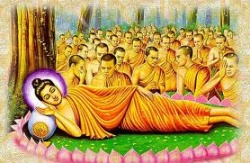Difference between revisions of "Anāgāmī"
Jump to navigation
Jump to search
m (Text replacement - "Category:Pali terminology" to "{{PaliTerminology}}") |
|||
| Line 7: | Line 7: | ||
"A [[being]], through the disappearing of the 5 lower [[Fetters]] ([[Samyojana]]), reappears in a [[higher]] [[World]] (amongst the [[devas]] of the [[Pure Abodes]], [[Suddhāvāsa]]), and without returning from that [[World]] (into the [[sensuous sphere]]) he there reaches [[Nibbāna]]. | "A [[being]], through the disappearing of the 5 lower [[Fetters]] ([[Samyojana]]), reappears in a [[higher]] [[World]] (amongst the [[devas]] of the [[Pure Abodes]], [[Suddhāvāsa]]), and without returning from that [[World]] (into the [[sensuous sphere]]) he there reaches [[Nibbāna]]. | ||
| − | : (1) "He may, immediately after appearing there (in the [[Pure Abodes]]) or without having gone [[beyond]] half of the [[Life]]-[[time]], attain the holy [[path]] for the [[overcoming]] of the [[higher]] [[Fetters]]. Such a [[being]] is called 'one who reaches [[Nibbāna]] within the first half of the [[Life]]' ([[antarā-parinibbāyī]]). | + | : (1) "He may, immediately after appearing there (in the [[Pure Abodes]]) or without having gone [[beyond]] half of the [[Life]]-[[time]], attain the {{Wiki|holy}} [[path]] for the [[overcoming]] of the [[higher]] [[Fetters]]. Such a [[being]] is called 'one who reaches [[Nibbāna]] within the first half of the [[Life]]' ([[antarā-parinibbāyī]]). |
| − | : (2) "Or, whilst living [[beyond]] half of the [[lifetime]], or at the moment of [[Death]], he attains the holy [[path]] for the [[overcoming]] of the [[higher]] [[Fetters]]. Such a [[being]] is called 'one who reaches [[Nibbāna]] after crossing half the [[Life]]-[[time]]' ([[upahacca-parinibbāyī]]). | + | : (2) "Or, whilst living [[beyond]] half of the [[lifetime]], or at the [[moment]] of [[Death]], he attains the {{Wiki|holy}} [[path]] for the [[overcoming]] of the [[higher]] [[Fetters]]. Such a [[being]] is called 'one who reaches [[Nibbāna]] after crossing half the [[Life]]-[[time]]' ([[upahacca-parinibbāyī]]). |
| − | : (3) "Or, with exertion he attains the holy [[path]] for the [[overcoming]] of the [[higher]] [[Fetters]]. Such a [[being]] is called 'one who reaches [[Nibbāna]] with exertion' ([[sasankhāra-parinibbāyī]]). | + | : (3) "Or, with {{Wiki|exertion}} he attains the {{Wiki|holy}} [[path]] for the [[overcoming]] of the [[higher]] [[Fetters]]. Such a [[being]] is called 'one who reaches [[Nibbāna]] with {{Wiki|exertion}}' ([[sasankhāra-parinibbāyī]]). |
| − | : (4) "Or, without exertion he attains the holy [[path]] for the [[overcoming]] of the [[higher]] [[Fetters]]. Such a [[being]] is called 'one who reaches [[Nibbāna]] without exertion' ([[asankhāra-parinibbāyī]]). | + | : (4) "Or, without {{Wiki|exertion}} he attains the {{Wiki|holy}} [[path]] for the [[overcoming]] of the [[higher]] [[Fetters]]. Such a [[being]] is called 'one who reaches [[Nibbāna]] without {{Wiki|exertion}}' ([[asankhāra-parinibbāyī]]). |
| − | : (5) "Or, after vanishing from the [[Heaven]] of the [[Aviha]]-[[gods]] (s. [[Suddhāvāsa]]), he appears in the [[Heaven]] of the unworried ([[atappa]]) [[gods]]. After vanishing from there he appears in the [[Heaven]] of the clearly-visible ([[sudassa]]) [[gods]], from there in the [[Heaven]] of the clear-visioned ([[sudassī]]) [[gods]], from there in the [[Heaven]] of the [[highest]] ([[Akanittha]]) [[gods]]. There he attains the holy [[path]] for the [[overcoming]] of the [[higher]] [[Fetters]]. Such a [[being]] is called 'one who passes up-stream to the [[highest]] [[gods]]' ([[uddhamsota-Akanittha-gāmī]])." | + | : (5) "Or, after vanishing from the [[Heaven]] of the [[Aviha]]-[[gods]] ([[s]]. [[Suddhāvāsa]]), he appears in the [[Heaven]] of the unworried ([[atappa]]) [[gods]]. After vanishing from there he appears in the [[Heaven]] of the clearly-visible ([[sudassa]]) [[gods]], from there in the [[Heaven]] of the [[clear-visioned]] ([[sudassī]]) [[gods]], from there in the [[Heaven]] of the [[highest]] ([[Akanittha]]) [[gods]]. There he attains the {{Wiki|holy}} [[path]] for the [[overcoming]] of the [[higher]] [[Fetters]]. Such a [[being]] is called 'one who passes up-stream to the [[highest]] [[gods]]' ([[uddhamsota-Akanittha-gāmī]])." |
{{R}} | {{R}} | ||
Revision as of 17:27, 28 January 2015
- See also:Anāgāmi
the 'Non-returner', is a Noble Disciple (Ariya-puggala) on the 3rd stage of holiness.
There are 5 classes of Non-Returners, as it is said (e.g. Pug. 42-46):
"A being, through the disappearing of the 5 lower Fetters (Samyojana), reappears in a higher World (amongst the devas of the Pure Abodes, Suddhāvāsa), and without returning from that World (into the sensuous sphere) he there reaches Nibbāna.
- (1) "He may, immediately after appearing there (in the Pure Abodes) or without having gone beyond half of the Life-time, attain the holy path for the overcoming of the higher Fetters. Such a being is called 'one who reaches Nibbāna within the first half of the Life' (antarā-parinibbāyī).
- (2) "Or, whilst living beyond half of the lifetime, or at the moment of Death, he attains the holy path for the overcoming of the higher Fetters. Such a being is called 'one who reaches Nibbāna after crossing half the Life-time' (upahacca-parinibbāyī).
- (3) "Or, with exertion he attains the holy path for the overcoming of the higher Fetters. Such a being is called 'one who reaches Nibbāna with exertion' (sasankhāra-parinibbāyī).
- (4) "Or, without exertion he attains the holy path for the overcoming of the higher Fetters. Such a being is called 'one who reaches Nibbāna without exertion' (asankhāra-parinibbāyī).
- (5) "Or, after vanishing from the Heaven of the Aviha-gods (s. Suddhāvāsa), he appears in the Heaven of the unworried (atappa) gods. After vanishing from there he appears in the Heaven of the clearly-visible (sudassa) gods, from there in the Heaven of the clear-visioned (sudassī) gods, from there in the Heaven of the highest (Akanittha) gods. There he attains the holy path for the overcoming of the higher Fetters. Such a being is called 'one who passes up-stream to the highest gods' (uddhamsota-Akanittha-gāmī)."
